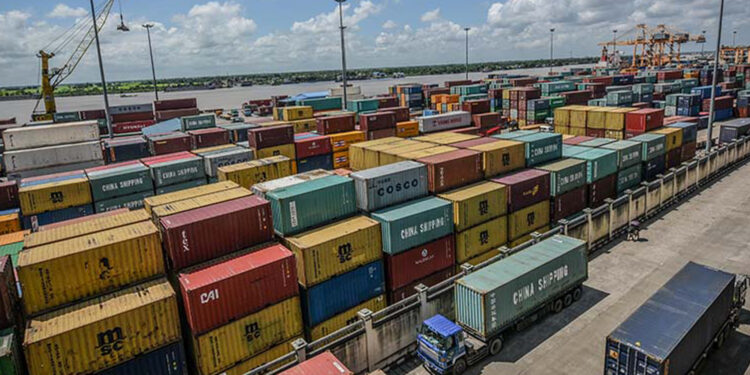The junta-controlled Central Bank of Myanmar reduced the required amount of foreign currency export earnings that has to be converted into the national currency, the kyat, from 35 to 25 percent, the central bank said in a statement on Thursday.
The junta debuted its forex-conversion policy for exporters in August 2022, requiring exporters to convert 65 percent of their export earnings into kyats. In July 2023, it reduced this to 50 percent and in December last year it cut the requirement to 35 percent.
Exporters were required to convert their foreign currency earnings into kyats at authorized dealers at fixed rates that were far lower than market rates.
In its latest reduction announced on Thursday, the central bank said that the percent of export income that must be converted into kyats has been lowered to 25, leaving exporters with only 65 percent of their earnings to purchase goods or services outside of Myanmar.
The conversion rate cut is effective today, the statement said.
Merchants, however, said that even with the reduction, forced currency conversion at below market rates remains burdensome and insist that the practice needs to be abolished.
Exporter U Tay said, “We have been demanding [an end to forced conversion of export earnings into the local currency] for a long time.” “This relief of such a tiny 10 percentage point reduction is like feeding roasted lablab beans to a toothless elderly man,” he quipped. (Lablab means are known for their hardness.)
Last week, the junta’s commerce ministry revoked the export licenses of more than 100 companies for allegedly failing to convert US dollar earnings into the domestic currency and another 12 were ordered to convert a combined US$ 17 million into kyats within two weeks.
Merchants close to the license-losing and reprimanded companies said that today’s announcement by the central bank will have no effect on the companies that lost their licenses and that the 12 ordered to convert $17 million into kyats will have to adhere to the 35 percent rule.
Owners of companies whose licenses were revoked face charges under the Export and Import Law that could see them jailed and their assets confiscated.
Exporters have lambasted the mandatory currency conversion rules imposed by the junta and called for them to be abolished.
Myanmar has experienced a collapse in exports and foreign direct investment since the coup, while domestic businesses lost access to international loans. With almost no US dollars flowing into Myanmar, the regime has had to sell its foreign reserves.
The shortage of US dollars in Myanmar, and the artificially low conversion rates set by the central bank, led to the revival of a black market for exchanging foreign currency.
The junta has, however, found money to buy weapons. In the first two years after the coup, it imported at least US$1 billion worth of weapons and related materials from Russia, China and other countries, according to United Nations estimates.

















